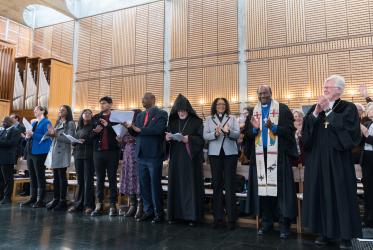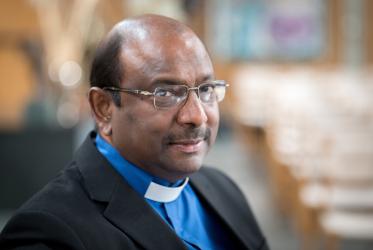First sermon of the Rev. Dr Olav Fykse Tveit as WCC general secretary
At the Ecumenical Centre in Geneva
11 January 2010
You are my Son, the beloved.
(Luke 3:22)
Dear Sisters and Brothers in Christ!
I want to start by wishing you all a very blessed and happy New Year! It is new in so many ways. The beginning of a year opens up the possibilities of new days, weeks and months; in this case also of a new decade. Yet as we enter into the second decade of the 21st century, the world continues to face many crises taken over from the old decade: financial crisis, climate crisis, a food crisis, a new wave of terrorism and violence, new burdens of injustice and violations of human rights for many peoples in different cultures, of different ethnicities and and faiths. These realities are brought home to us week by week as we pray for the different countries and their peoples through the ecumenical prayer cycle, last week Iran, Iraq, Yemen among others … this week Turkey, Greece and Cyprus. We start this year also with a greater concern for the religious freedom of some of our Christian sisters and brothers in several places.
It is also a new decade during which we are going to give content and shape to the ecumenical movement in the 21st Century. There are new challenges - and old ones – but there are also so many opportunities for us to make a contribution to something new.
This is the dream we carry through the world
that something fantastic will happen
that it has to happen
that time will open by itself
that doors shall open by themselves
that the heart will find itself open
that mountain springs will jump up
that the dream will open by itself
that we one early morning
will slip into a harbour
that we have never known.
This poem of the Norwegian poet Olav H. Hauge, here in English translation by Robert Bly, expresses the dream of love, love for the life we have, love for the world we live in, today and tomorrow.
For some of you it is a new year with new challenges and new blessings in your personal lives. For this house the new year also brings a new general secretary of the World Council of Churches. For me and my wife this is a new phase of our lives, living in Geneva with you and with a new framework for our daily life. For me it is a new part of my life, entering into a new calling, a new context with new collegues. And I want to express my deep gratitude for the way I have been received among you, dear colleagues of the WCC and those of you serving other organizations in this house! This warm - and lovely - welcome gives me courage and enthusiasm to enter into the many tasks, both old and new.
Changing the basic conditions of life by moving house and starting a new job at the end of one year and the beginning of another reminds me of the prayer my mother always asked my father to read for us every New Year’s Eve. She wanted to hear the prayer her father had read every New Year’s Eve, he was a peasant farmer on one of the smallest farms in Norway. Living far away from any church building he did what Luther encouraged parents of the house to do in the Small Catechism: to read the Scriptures and to pray. It’s a prayer for new and blessed times, for crops in the fields, for peace in the country and for the work of the Spirit in the church. It concludes like this: "In the name of Jesus may the old year be over. In the name of Jesus may the New Year begin."
Dear friends, we are here to look backwards in the name of Jesus and let the past be the past. We are here to let everything begin in the name of Jesus: the New Year and the new decade for the world and for the ecumenical movement; and also the new phase in each of our lives – both individually and for all of us together. So let it begin in the name of Jesus, the beloved. In this name we can have courage to start again.
This hope is the light of Epiphany, the light of Christ shining upon all (the theme of the 3rd European Ecumenical Assembly in 2007 in Sibiu, Romania). In a very special way it comes to us through the text of the baptism of Jesus in the river Jordan. At the very lowest place on earth, 300 meters below sea level, and even lower than that, the voice from the highest heaven is heard. The creative words of God reach to the deepest depths of this world, even to the deepest shame in the life of human beings. Jesus did not give in to the temptation to be on the highest mountain and have the world at his feet. Rather, Jesus started his ministry by asking for baptism, symbolic of conversion from evil and sin. He himself did not need the baptism of John as a sign of conversion. Yet he entered into this sign of full solidarity with all human beings, even the sinful, hypocritical, the unjust and those abusing their power. He went down to the deepest depths of life, for the act of baptism is a symbol of drowning, of death. And because of this it became a sign of his calling, to be with us in all things, even in death. Luke’s gospel tells us that this was the moment when the words were heard "You are my Son", words evocative of those from Psalm 2 usually said over the elevated and powerful, the King. But now another qualification was added: "You are my Son, the beloved."
The movement to which we belong starts with Christ’s baptism. And even before that. Before becoming the loving saviour and friend, the liberator and the prince of peace, he is the beloved Son. Every sign of love has its origin in God. Jesus came to us as the beloved. The mystery of our faith is not that we have an answer to the mystery of evil, to the temptations or the acts of evil. The mystery of our faith is the goodness of God, the love of God that comes to us through the signs of love and solidarity and hope in the baptism of the beloved Jesus. Further, the mystery of faith comes to us through the words from above, from God; through the means of grace through which we have been received by God and by the Church; most of all through the act of our baptism through which we ourselves were baptized, in the name of the Father, the Son and the Holy Spirit, into the relations of love, the movement of love. We came into this movement of the One beloved, and became, therefore, the movement of the many beloved.
This is our beginning. Let us celebrate and remind one another how much we are given in the name of Jesus, as we enter into the many fights against evil, against injustice, against our own shortcomings and sins. Our life together can begin in the blessed name of Jesus, the beloved, just as everything in the past can be seen in the light of Jesus and everything in the future can be faced in the name of Jesus.
Some weeks ago I was asked to preach at a celebration of the 10th anniversary of the Joint Declaration on the Doctrine of Justification - one of the rich fruits of the ecumenical movement which has led to a common recognition of how God’s love comes to us through Jesus Christ. The service took place in a Lutheran Free Church in Oslo, with participants from the Roman Catholic Church, the Lutheran Church of Norway and the Methodist Church in Norway (acknowledging the worldwide Methodist Church’s official support of the document).
A week later a Lutheran lecturer in theology, a woman, wrote an article in a Norwegian church newspaper criticizing my sermon, entitled "Where was Jesus?" She wrote about how disappointed she was that the incoming general secretary of the World Council of Churches did not preach more about Jesus Christ and the atonement of Jesus for our sins at such an occasion. You can probably imagine that my first reaction was that this was rather unfair. So many of the core expressions of the significant document were read at the service, but when I from the pulpit saw that all of those there were people who knew the Christian doctrine of justification well already, I rather preached about how the people in the street outside could see the light of justification in their lives. Well, I still think I should have said what I did in the sermon, about the mystery of God as the mystery of undeserved goodness; the movement of love coming from God, through creation, through the signs of goodness from other human beings, and most of all through the Gospel – the word of God’s love to the Church and the world. We celebrated that this word of faith makes us one – so the world can believe it.
I never replied to the criticism in the article. She heard what she heard. However, I think critical remarks can be useful, whether we feel they are justified or not, they can remind us of something. So I decided to let the question remain in my mind: Where is Jesus? Does Jesus disappear from our preaching, from our thinking, from our planning, from our action?
The time of Epiphany helps us to see how the mystery of goodness and the movement of love come to us in Jesus. It does so in the baptism of Jesus, as the first transformative sign of the life and death and resurrection of Jesus.
At the site of Christ’s baptism in the Jordan an olive tree has been planted. Two and a half years ago, as part of the launching of the Amman Call for justice and peace for both peoples in the Holy Land, those of us attending the meeting were joined by others to go to this special place. On behalf of all of us, Samuel Kobia planted there an olive tree as a sign of our commitment to work for a just peace. I hope it is still there. This, then, is the perspective in which I see my calling as I now succeed Sam. We are one in the name of Jesus, the beloved and the loving Son. Jesus calls us all to follow him in a daily conversion from evil; to each day bring the hope of peace and justice to the whole world; and to do this inspired by the Holy Spirit. As at our baptism, we can hear the blessing of our going out and coming in, from now and for ever.
This impulse of the baptism of Jesus in the River Jordan, this is our dream that something has to happen, that something will be rising from the depths of this world by the informative and transformative word from above. In this beloved ecumenical movement, we also enter into the depths of this world and its suffering and divisions – and together, we shall be the voice calling to newness of life in the name of the beloved Son. Today this voice says to you and to me: "You are my beloved daughter. You are my beloved son."
Glory be to the Father, and to the Son, and to the Holy Spirit; One true God; as it was in the beginning, is now, and will be for ever. Amen.




